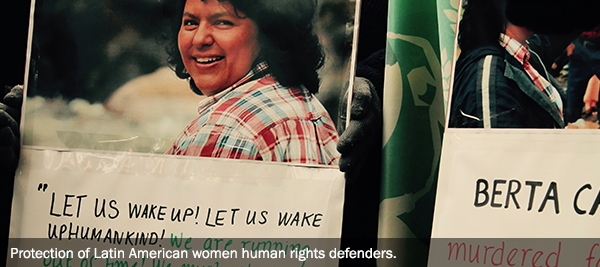
On International Women’s Day and one year after the murder – still unpunished – of the Honduran defender Berta Cáceres, the European network of NGOs ‘Grupo Sur’, based in Brussels, called on the #EU to consider as a priority, a guarantee for the safety, life and work of Latin American human rights defenders within the framework of political dialogue, cooperation and trade relations between the two regions.
The European Parliament resolution on February 16th 2017 (2017/2565 (RSP) has already condemned the fact that human rights defenders in Latin America are working in a climate of hostility and facing harassment, criminalization, coercion, smear campaigns, intimidation and murder.
‘Grupo Sur’ said it wants to highlight that women defenders face this reality from a situation of greater vulnerability. They are criminalized not only for their activism but also for breaking the role traditionally attributed to women by participating in the public sphere. Defenders are therefore not only victims of political violence due to their work, but they are also victims of sexist violence, sexual abuse and feminicide.
As Berta Caceres, co-founder of COPIHN and human rights and natural assets defender said before being assassinated: “It is not easy to be a woman leading indigenous resistance processes. In an incredibly patriarchal society women are very exposed, we have to face a lot of risks, sexist and misogynist campaigns. ”
According to a recent ‘IM-Defensoras’ report, between 2012 and 2014 a total of 1,688 attacks on women defenders were committed in El Salvador, Guatemala, Honduras and Mexico. Likewise, between 2012 and 2016, there were 42 murders of human rights defenders, which, have mostly gone unpunished.
Many attacks perpetrated and documented against defenders take place within the framework of the defense of natural assets against the intervention of multinational companies, some of them with European investment. In this context, sexual violence against women is used as a tool to intimidate and inhibit their participation in the defense of their territories.
Extractive policies and the increase in megaprojects in the region, the closing of democratic spaces and the increase of militarization are only some of the factors that, in the last years have generated the increase of the violence exerted against human rights defenders in Latin America.
Commercial Rights vs Human Rights
The Association Agreement signed by the European Union with six Central American countries and the Free Trade Agreement with Colombia, Peru and Ecuador include human rights clauses, “…but since the implementation of these agreements, we have verified the non-compliance with these clauses, while issues related to the protection of investments and deregulation of markets is scrupulously applied” said Erika González from the ‘Grupo Sur’ network.
“The coherence of the European Union’s policies in this area requires rigorous enforcing of such clauses, or even the suspension of agreements, especially in countries where the situation of violation of human rights, violence against women, feminicide and impunity rates reach quotas of genuine social disaster.”
González added, “That is why it is necessary for the EU to support and promote the safety of human rights defenders through all means available within the framework of political dialogue, cooperation and relations with the Latin American region.”
In this way, ‘Grupo Sur’ calls on the EU institutions to respond to the actions of their companies in the region, to promote compliance with international law, to ensure the effective implementation of the EU Guidelines on Human Rights Defenders in the foreign policy framework, and pay special attention to the specific situation faced by women defenders, taking the necessary measures to ensure the continuation of their work in conditions of security and equality.